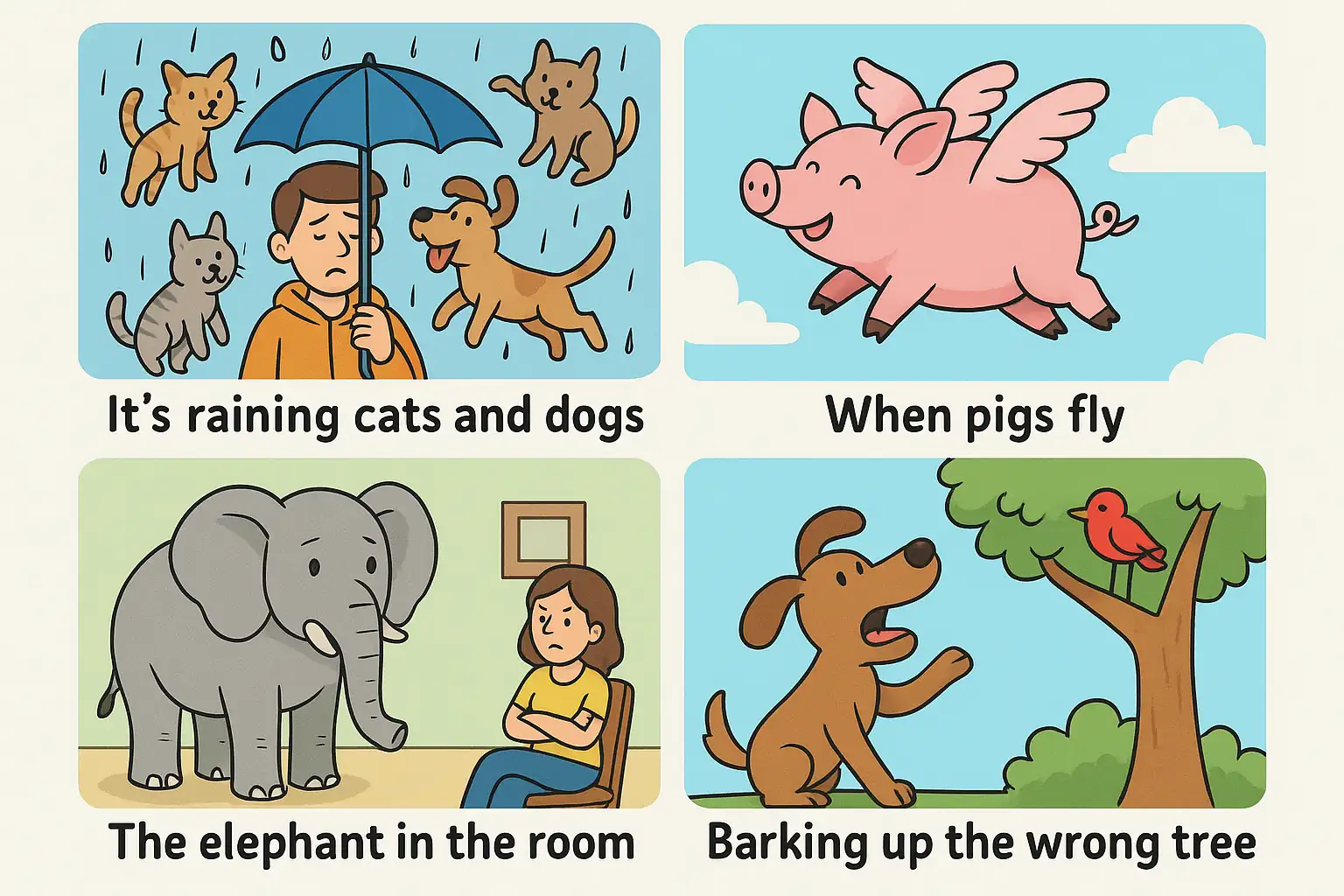Learning English can be fun and exciting. But to speak like a native, you need more than just basic words and grammar. Idioms and phrases in English are special sayings that don’t mean what the words say exactly. They add color to your talk and help you understand movies, books, and chats with friends. If you’re a beginner, don’t worry. This guide will help you unlock fluency with simple explanations.
Idioms are groups of words with a hidden meaning. For example, “it’s raining cats and dogs” does not mean animals fall from the sky. It means heavy rain. Why learn them? They make your English sound natural. Without them, you might miss jokes or feel lost in talks. Many English learners struggle at first, but practice makes it easy.
In this article, we’ll cover practical idioms and phrases in English. We’ll group them by themes like everyday life, food, animals, weather, body parts, and more. Each one has a simple meaning and examples. We’ll share over 50 idioms to help you start. At the end, get tips to learn them fast. Let’s begin!

Everyday Idioms and Phrases in English
These are common sayings you hear in daily life. They help in simple chats.
- Break the ice
Meaning: Start a talk to make people feel at ease.
Example: At the party, I told a joke to break the ice with new friends. - Hit the nail on the head
Meaning: Say something exactly right.
Example: You hit the nail on the head when you said the problem is too much work. - Piece of cake
Meaning: Very easy to do.
Example: The math test was a piece of cake for me. - Cost an arm and a leg
Meaning: Very costly.
Example: That new bike costs an arm and a leg, so I can’t buy it now. - Bite off more than you can chew
Meaning: Take on too much work.
Example: I bit off more than I could chew by joining three clubs at school. - Beat around the bush
Meaning: Avoid the main point.
Example: Stop beating around the bush and tell me what you want. - Cry over spilled milk
Meaning: Worry about past mistakes you can’t fix.
Example: Don’t cry over spilled milk; let’s learn from the error. - Get your act together
Meaning: Organize yourself better.
Example: You need to get your act together before the big test. - Kill two birds with one stone
Meaning: Solve two things with one action.
Example: By shopping online, I kill two birds with one stone: save time and money. - Let the cat out of the bag
Meaning: Tell a secret by accident.
Example: I let the cat out of the bag about the birthday gift.

Food-Related Idioms and Phrases in English
Many idioms use food to describe ideas. They’re tasty to learn!
- Spill the beans
Meaning: Share a secret.
Example: Who spilled the beans about our surprise trip? - A piece of cake (We already have this, but it’s food too!)
Note: Some idioms fit in more than one group. - Bring home the bacon
Meaning: Earn money for the family.
Example: My dad brings home the bacon with his job. - Cool as a cucumber
Meaning: Stay calm in stress.
Example: She was cool as a cucumber during the speech. - In a pickle
Meaning: In a tough spot.
Example: I’m in a pickle because I lost my keys. - Take it with a grain of salt
Meaning: Don’t believe it fully.
Example: Take his story with a grain of salt; he likes to joke. - Butter someone up
Meaning: Flatter to get something.
Example: He buttered up the teacher to get extra time on homework. - The icing on the cake
Meaning: Something extra good.
Example: Winning the prize was the icing on the cake after a fun day.

Animal-Related Idioms and Phrases in English
Animals make idioms fun and easy to picture.
- When pigs fly
Meaning: Something impossible.
Example: He’ll clean his room when pigs fly! - Raining cats and dogs
Meaning: Heavy rain.
Example: We can’t go out; it’s raining cats and dogs. - Hold your horses
Meaning: Wait a bit.
Example: Hold your horses; I’ll be ready soon. - The elephant in the room
Meaning: Big issue everyone ignores.
Example: The low grades were the elephant in the room at the meeting. - A fish out of water
Meaning: Feel uncomfortable in a place.
Example: At the fancy party, I felt like a fish out of water. - Barking up the wrong tree
Meaning: Wrong idea or blame.
Example: You’re barking up the wrong tree if you think I took your book.

Weather-Related Idioms and Phrases in English
Weather describes feelings or events.
- Under the weather
Meaning: Feel sick.
Example: I’m under the weather today, so I’ll rest. - Every cloud has a silver lining
Meaning: Good in bad times.
Example: I lost my job, but every cloud has a silver lining; now I have a better one. - Head in the clouds
Meaning: Not paying attention, dreaming.
Example: Stop having your head in the clouds and focus on work. - Storm in a teacup
Meaning: Big fuss over small thing.
Example: Their argument was a storm in a teacup. - Fair-weather friend
Meaning: Friend only in good times.
Example: He’s a fair-weather friend; he left when I needed help.
Body Parts Idioms and Phrases in English
Body words often mean actions or traits.
- Break a leg
Meaning: Good luck (before a show).
Example: Break a leg on your test tomorrow! - All ears
Meaning: Listening carefully.
Example: Tell me your story; I’m all ears. - Put your foot in your mouth
Meaning: Say something embarrassing.
Example: I put my foot in my mouth by asking about her ex. - Heart of gold
Meaning: Very kind person.
Example: My grandma has a heart of gold; she helps everyone. - Lend a hand
Meaning: Help someone.
Example: Can you lend a hand with the boxes? - Keep an eye on
Meaning: Watch carefully.
Example: Keep an eye on the baby while I cook. - Play it by ear
Meaning: Decide as you go.
Example: We have no plan; we’ll play it by ear.

Work and Success Idioms and Phrases in English
These help in school or job talks.
- Burn the midnight oil
Meaning: Work late at night.
Example: I burned the midnight oil to finish the report. - Throw in the towel
Meaning: Give up.
Example: After many tries, he threw in the towel. - The ball is in your court
Meaning: Your turn to act.
Example: I sent the email; now the ball is in your court. - Hit the jackpot
Meaning: Big win or success.
Example: She hit the jackpot with her new business idea. - Cut corners
Meaning: Do something cheaply or poorly.
Example: Don’t cut corners on your homework. - Bite the bullet
Meaning: Face a hard task.
Example: I bit the bullet and asked for a raise. - On the same page
Meaning: Agree with someone.
Example: Are we on the same page about the plan? - Think outside the box
Meaning: Be creative.
Example: To solve this, think outside the box.

Emotion and Feeling Idioms and Phrases in English
Express how you feel with these.
- On cloud nine
Meaning: Very happy.
Example: After the win, I was on cloud nine. - Speak of the devil
Meaning: Person appears when talked about.
Example: Speak of the devil, here comes John! - See eye to eye
Meaning: Agree fully.
Example: We don’t see eye to eye on movies. - Once in a blue moon
Meaning: Rarely happens.
Example: I eat fast food once in a blue moon. - Add insult to injury
Meaning: Make a bad thing worse.
Example: He lost the game, and to add insult to injury, it rained. - Blow off steam
Meaning: Release anger.
Example: I run to blow off steam after a bad day. - Jump for joy
Meaning: Be very excited.
Example: She jumped for joy when she got the job.
Tips to Learn Idioms and Phrases in English
Now that you have these practical idioms and phrases in English, how do you remember them? Here are simple tips for beginners:
- Start small: Pick 5-10 idioms each week. Write them in a notebook with meanings and your own examples.
- Use them daily: Try saying them in talks. For example, tell a friend, “That was a piece of cake!”
- Watch and read: See English shows like “Friends” or read easy books. Note idioms you hear.
- Play games: Make flashcards or do quizzes online. Apps like Duolingo have idiom lessons.
- Group them: Like in this article, learn by themes. It helps your brain connect ideas.
- Practice with friends: Chat with other learners. Share idioms and explain them.
- Don’t fear mistakes: If you use one wrong, it’s okay. Native speakers will help.
Learning idioms unlocks fluency because they show real English use. With time, you’ll sound natural and understand more.
Want to talk with more confidence? Discover how to start a conversation and keep it going smoothly.
Conclusion
Congratulations! You’ve learned over 50 practical idioms and phrases in English. From “break the ice” to “jump for joy,” these will help you in daily life, work, and fun. Remember, idioms make English alive. Keep practicing to unlock fluency. If you use them often, you’ll see big improvement. What’s your favorite idiom? Try using one today!
Tired of feeling confused by English idioms? EnglishFact’s beginner courses break down common phrases and expressions, giving you the confidence to understand and use them in everyday conversation. Stop guessing and start speaking like a pro!
Ready to unlock fluency? Talk to us on WhatsApp or sign up today!




